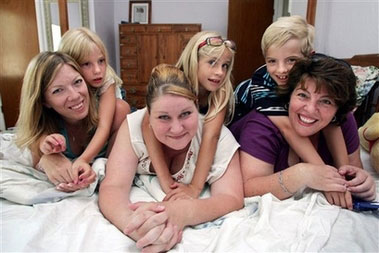NEDERLAND, Colo. - Michelle Jorgenson thought it was odd that her 8-year-old
daughter Cheyenne - conceived with sperm from a mystery man known to Jorgenson
only as Donor 3066 - was extremely sensitive to sound and walked on her toes.
Jorgenson started checking on the Internet and soon learned of at least six
other children around the country who were fathered by 3066. And of those seven,
she discovered to her alarm, two have autism, and two others, Cheyenne included,
show signs of a sensory disorder tied closely to autism.

From left, Dawn
Warthen and her daughter Allyson Cross, Michelle Jorgenson and her
daughter Cheyenne, and Jenafer Elin and her son Joshua hang out in a
bedroom during their reunion Sunday, June 25, 2006 in Fresno, Calif. The
mothers located one another starting a year ago through the Donor Sibling
Registry, a Web site that enables mothers artificially inseminated by the
same donor _ and children fathered by the same man - to find each
other. In this case, the women all used 3066, whose sperm was provided by
the California Cryobank, based in Los Angeles. [AP]
|
The children's mothers located one another beginning a year ago through the
Donor Sibling Registry, a Web site run out of this Colorado mountain town. It
enables mothers artificially inseminated by the same donor - and children
fathered by the same man - to find each other.
In this case, the women all used 3066, whose sperm was provided by the
California Cryobank, based in Los Angeles.
"Pretty much you're thinking this person has a perfect medical history," said
Jorgenson, who lives in Sacramento, Calif. "And then later I find out that some
of the other siblings have other disabilities that are or are not attributed to
the donor. I wouldn't have chose him had I known this had existed."
The Web site that brought them together is run out of Wendy Kramer's home in
Nederland. Kramer started the registry so her son Ryan could find his siblings,
and she said it has led to family reunions and brought joy to people who send
out e-mail inquiries that typically begin, "Hi, you don't know me, but we're
related."
But the site has also become a clearinghouse for those seeking answers about
everything from potentially dangerous medical conditions to personality quirks.
Often, they come away with more questions than answers because most sperm banks
and clinics refuse to share confidential files about donors.
"There are people on our Web site seeking siblings because their kids have
medical issues, for sure, and even in a medical emergency the sperm banks won't
facilitate any contact, which is kind of frustrating," Kramer said.
So far, the mothers who were impregnated with 3066's sperm have been
frustrated in their attempts to find out more about the man and confirm their
suspicions that their children inherited their medical problems from him.
But they have formed a support group of sorts, comparing notes on their
youngsters and arming themselves with medical information they might need
someday.
Researchers do not know whether autism, a disorder that affects the ability
to form normal social relationships and communicate with others, is a hereditary
disease or an acquired illness, according to the Autism Society of America. It
affects one in 175 children ages 4 through 17, the society said.
The Web site helped Jorgenson find Jenafer Elin, whose 9-year-old son Joshua,
another offspring of 3066, is also sensitive to noise and hates wearing clothing
with tags. Cheyenne, Joshua and their 7-year-old half-sister Allyson and their
mothers met in Fresno, Calif., this summer for a reunion.
"They got along well and they hit it off immediately," said Allyson's mother,
Dawn Warthen of Taneytown, Md. "They referred to each other as brother and
sister. They all looked very similar with their blond hair and the girls both
had shocking blue eyes."
Donor 3066 - a man of Norwegian and German descent and a member of the Screen
Actors Guild - filled out a medical profile and reported only that his paternal
grandmother had high blood pressure, Jorgenson said.
"Now I've learned more and more history about the other siblings, so you kind
of say, `Hey, maybe the donor did know something but didn't mention it,'"
Jorgenson said. She said she called the sperm bank for more information about
3066 and was turned down.
Cappy Rothman, medical director and co-founder of the California Cryobank,
said 3066 has been put on "restricted" status - meaning women can still use his
sperm, but are warned that problems could arise in their children - because a
child fathered by him was diagnosed with what Rothman described only as a
"metabolic problem." Rothman said no clients have told the cryobank their child
had autism.
Rothman said the sperm bank tests for major infectious illnesses such as
hepatitis and HIV, but not more exotic medical conditions, and it is not
required by law to do so. The sperm bank relies on donors to fill out medical
histories extending back three generations.
As for its policies on privacy, Rothman said it does not disclose its donors'
identities without their consent.
Arthur Caplan, a University of Pennsylvania bioethicist, said the sperm bank
field exists "somewhere between the Wild West and chaos," with no regulations
regarding privacy or screening for noninfectious diseases.
"The doctors don't want regulations. The couples who want the treatments
don't want regulations. And politicians don't want to go in and regulate because
it puts them right smack in the middle of discussions of things like embryos,"
he said.
The mothers who used sperm from 3066 said they want more information from
sperm banks, not just for themselves but for other mothers trying to figure out
why their child is falling ill or acting differently.
"They want to know: `Why did this happen to my child?'" Jorgenson said.